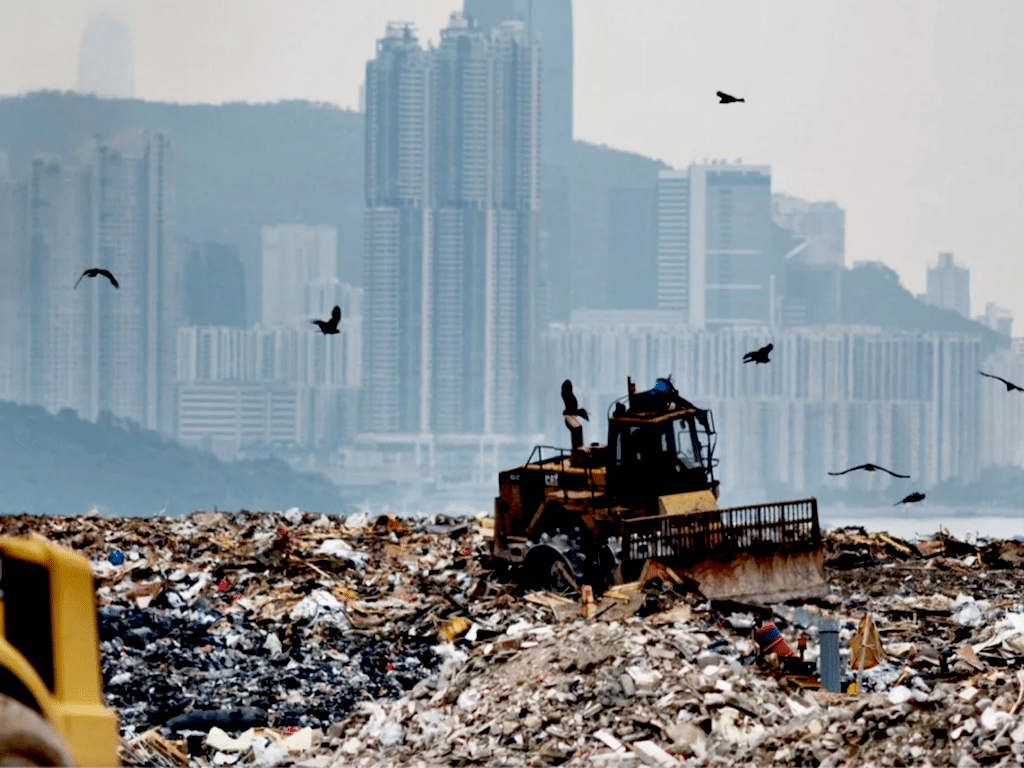4 Mins Read
A recent investigation by Hong Kong local news media HK01 has revealed that plastic bottles collected in recycling bins at residential housing estates have been sent to landfills. Using plastic bottles wired with GPS trackers, the journalists located that out of 14 housing estates, both public and private, the plastic contents in recycling bins of 9 buildings were not being recycled.
Last year, investigative reporters at HK01 wired GPS trackers onto a number of plastic bottles that were then put inside the recycling bins of 14 public and private housing estates in Hong Kong.
Revealing the findings last week, the journalists located 7 of the devices in landfills in Nim Wan and Lin Ma Hang in New Territories, and 2 devices were tracked to waste collection stations across Kowloon. The results suggest that the majority of items placed in recycling bins in residential buildings are not being properly recycled.
Of these 9 housing estates that sent recyclable waste to landfills and waste collection stations, reporters found that 5 of the buildings had previously been awarded under the Environment Protection Department’s (EPD) waste separation and collection scheme in 2019.
While the government introduced a centralised plastic collection programme in October 2019, the latest investigative report suggests that these efforts fall far from the mark.
Cleaners at some estates where items in recycling bins ended up in landfills told the reporters that much of the plastic has not been recycled and is treated like “garbage”.
Others expressed that the collectors responsible for recycling had not visited the buildings for over 6 months, and therefore cleaners had little choice but to send them to municipal waste management to prevent recyclable plastics from spilling out of binds.
Green Sense, a local environmental group, told HK01 that the main reason behind the lack of recycling is due to the low value of plastics in Hong Kong. According to the group, one kilogram of collected, separated and processed plastic waste may only generate HK$0.30 – HK$0.50 (US$0.039 – US$0.065) for recyclers.
Recyclers in Hong Kong may therefore focus collecting cardboard or metal cans, which tend to fetch higher prices. Some recyclers who spoke to HK01 also lamented over the lack of space to store collected recyclable plastics, making it not only a costly exercise but physically impossible to continue taking in plastic waste.
Industry group Hong Kong Environmental Protection and Recycle Industry Sustainable Development Association says that one solution is for government authorities and property management companies to provide monetary subsidies for recyclers to incentivise proper collection and recycling of plastics.
For green groups in Hong Kong, the responsibility must lie across all industries and government stakeholders to improve the dire state of collection and recycling in the city.
“This highlights the need for transparency and accountability in the collection and recycling industry in Hong Kong,” Dana Winograd, director of operations at Plastic Free Seas told Green Queen.
“Plastic Free Seas is part of the multi-stakeholder Drink Without Waste initiative reducing waste from beverage consumption. One area we are focusing on is a reputable system of collection and recycling which the people of Hong Kong can trust.”
“Trust in the system is key to getting people to recycle, and recycling is imperative given that our landfills are almost full and we are sending 5.3 million plastic beverage bottles to landfill on a daily basis,” added Winograd.
However, for the majority of Hong Kong households, the problem lies in overconsumption of plastics, especially single-use products. Last year, EPD data showed that the average waste disposal rate per person in Hong Kong has reached the highest levels since records began in 1991.
While recycling remains inadequate in the city, and regulations over businesses to cut unnecessary packaging across the supply chain remains sparse, we must reflect on our individual consumption habits.
Sherry Fung Wong, co-founder Eco Drive Hong Kong, a local NGO campaigning against single-use plastics underlined the need for behavioural change through education and awareness raising: “For the time being, reducing is our only short term solution until Hong Kong catches up with plastic recycling or finds a viable eco-friendly alternative”.
Wong also emphasised the need for education and awareness raising, telling Green Queen that “the problem is people are unaware that every single piece of plastic they have ever used, still exists in some form on this Earth. If they realised this, they might think harder when making their everyday choices.”
Separating our plastic waste and putting it into recycling bins is simply not enough – we must eliminate as many plastics from our lives as possible, from buying packaging-free produce and upcycling existing plastic materials at home.
Lead image courtesy of Bloomberg.




